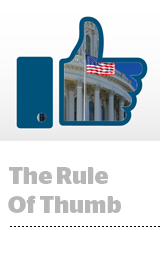 Facebook on Friday put in place new transparency and verification processes for political advertisers.
Facebook on Friday put in place new transparency and verification processes for political advertisers.
Last October, the company said it would begin allowing only authorized advertisers to run electoral ads, which explicitly advocate for or against an active political candidate. But that authorization will now apply to any advertisers who want to run “issue ads” that more broadly encompass hot-button political topics, according to a post by ads VP Rob Goldman and Alex Himel, VP of local and Pages.
Pages with “large numbers of followers” will have to go through a verification process, making it difficult for an influential Page to be managed through a fake account.
Facebook declined to comment, and is not providing more detail on the number of followers needed to trigger a verification requirement or on other signals it will use to monitor active Pages.
Last month, the Federal Election Commission said it will consider rules requiring advertiser disclosures on online electoral ads or ads fundraising for a candidate or party committee.
By extending its ad transparency program to issue ads, which many political advertisers expected Facebook to exempt since the FEC is only considering ads tied to candidates and parties, Facebook may be trying to preempt a call by the FEC for increased regulation.
Additionally, new curbs on issue ads will help Facebook prevent the kind of electoral influence and backlash Facebook confronted in the 2016 election. Most of the Facebook ads Russian political groups purchased during the 2016 US election were designed to spur debate over livewire issues, and didn’t explicitly advocate for one candidate or the other.
Facebook is also moving forward this summer with an advertiser transparency hub so users can see all the ads created by a Page, and not just those targeted to themselves. That policy applies to all advertisers, but is designed for and neatly exposes political “dark posts,” which allow an advertiser to keep some demographics from seeing some ads or content.
The Trump campaign aggressively used dark posts in its work with Facebook, so, for instance, only black people would be served a sound bite from 1996 of Hillary Clinton suggesting some African-American men are “super predators” and videos depicting Latin American and Muslim refugees as dangerous could be served to only white Republicans.
It was an effective way to distribute strong rhetoric without exposing candidates to the backlash they would get placing the same content on TV or in a public forum.
In Canada, where Facebook has been testing its initial political disclosure efforts this year, the added transparency has proven a useful tool for the press or opposing candidates and issue groups to expose information.
If one candidate’s ads are only being served to specific demographics, that strategy is transparent.
Four US political ad buyers – two liberals, one conservative and one from a nonpartisan agency – said they expect Facebook’s announcement to dampen political advertising during the 2018 midterms.
Facebook still has the mind share and attention of its users – aka voters – so candidates and issue groups will be active on Facebook, “but if you’re putting up objectionable ad content you’ll be called out for it,” said Mark Jablonowski, CTO of the liberal ad tech company DSPolitical.
Some buyers pour budgets into Facebook exactly because it enables that slicing and dicing of political audiences, said one conservative media buyer who wouldn’t comment publicly because he’s unsure how the policy will affect active medium-sized Facebook Pages with political followings, “but if this really does mean that a buyer won’t be able to just put in a credit card and buy political issue ads, then it’s going to shoo some people off the platform.”
This post was syndicated from Ad Exchanger.

More Stories
PHD Aotearoa’s new senior leadership team appointments
Burger on the dancefloor: Spark celebrates free data for Spotify music with exclusive event
Around the World: Elon Musk’s brand freefallin’ and celebrity splits shine in marketing